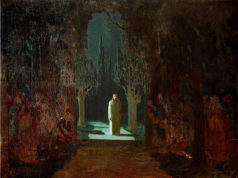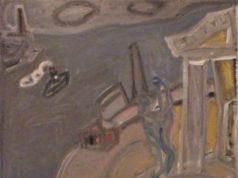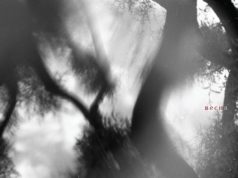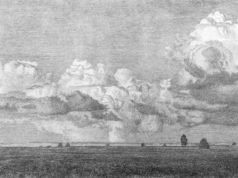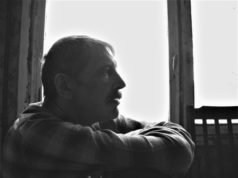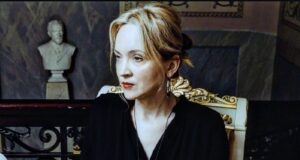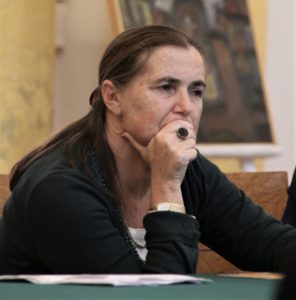 Annelisa Alleva (Rome) — poet, essayist, translator. She was born in Rome, where she lives. She studied Russian since childhood, in 1980 received a diploma in Russian language and literature at the Faculty of Philology of the First Roman University. In the spring of 1981 she met with Joseph Brodsky at the Faculty of Philosophy and Languages in Rome. Their friendship lasted until early 1989. The author of eight collections of poems. In Russian, it was published in the magazines: Star (2004, 2007, 2014), Cardinal Points (2011), New Youth (2010), Internet journal Formafluens (2010) «(2011). Since 2007 she participates in the annual International Poetic Festival in Georgia, translation conferences in Yasnaya Polyana, etc. Laureate of the Russia-Italy Prize in 2014 for the best translation into Italian of Anna Karenina (2010); Lerici Pea Award in 2009 for the anthology «Russian Contemporary Poetry» / Poeti russi oggi /; Prize of Sandro Penna in 2010 for the book of poems «La casa rotta»; Prize of Bella Akhmadulina in 2015 for the best essay of the year in Russian «Light.Statue.Thing. Notes about Joseph Brodsky’s semantics», Zvezda [Star], n.5, 2014, pp. 147-154. Correspondence with Joseph Brodsky and his father «(Star 5, 2015). In 2016 her last collection of poems «Naizust’/A memoria» was published by Pushkinsky Fond Edition in Saint Petersbourg. A volume of Pushkin’s poems «Love poems and epigrams» it was selected, translated and introduced by her, is coming out at the end of June 2018 in Tomsk thank to the Pushkin’s Museum and Literary Park Michajlovskoe, directed by Georgij Vasilevic.
Annelisa Alleva (Rome) — poet, essayist, translator. She was born in Rome, where she lives. She studied Russian since childhood, in 1980 received a diploma in Russian language and literature at the Faculty of Philology of the First Roman University. In the spring of 1981 she met with Joseph Brodsky at the Faculty of Philosophy and Languages in Rome. Their friendship lasted until early 1989. The author of eight collections of poems. In Russian, it was published in the magazines: Star (2004, 2007, 2014), Cardinal Points (2011), New Youth (2010), Internet journal Formafluens (2010) «(2011). Since 2007 she participates in the annual International Poetic Festival in Georgia, translation conferences in Yasnaya Polyana, etc. Laureate of the Russia-Italy Prize in 2014 for the best translation into Italian of Anna Karenina (2010); Lerici Pea Award in 2009 for the anthology «Russian Contemporary Poetry» / Poeti russi oggi /; Prize of Sandro Penna in 2010 for the book of poems «La casa rotta»; Prize of Bella Akhmadulina in 2015 for the best essay of the year in Russian «Light.Statue.Thing. Notes about Joseph Brodsky’s semantics», Zvezda [Star], n.5, 2014, pp. 147-154. Correspondence with Joseph Brodsky and his father «(Star 5, 2015). In 2016 her last collection of poems «Naizust’/A memoria» was published by Pushkinsky Fond Edition in Saint Petersbourg. A volume of Pushkin’s poems «Love poems and epigrams» it was selected, translated and introduced by her, is coming out at the end of June 2018 in Tomsk thank to the Pushkin’s Museum and Literary Park Michajlovskoe, directed by Georgij Vasilevic.
Our lonely home is silent,
With womenfolk asleep,
Their braids for bed attired,
And yet on guard I keep.
(Home from a Visit, Prayer for the Chalice, Мitkilibris SPb., 2004. p. 35)
Born under the sign of Libra on October 12, 1944 in Leningrad, Oleg Okhapkin had always felt a special affinity with the element of air. Which, if you bear in mind that Libra is one of air signs, seems quite natural.
In the first pages of Andrei Aryev’s preface to the 1970 poetry collection Prayer for the Chalice, which was only published by Mitkilibris publishing house in 2004, the poet is incidentally placed up in the air.
In the late 1960s, Okhapkin meets Brodsky (born under Gemini, another air sign) right under the Smolny Cathedral domes. This is how the critic and writer Andrei Aryev (1) (whose name is parenthetically reminiscent of ‘aria’, the Italian word for air, and hence, of a musical aria), describes the scene:
‘<…> the former vagabond Joseph Brodsky was climbing the rafters of the cathedral towards the handyman Oleg Okhapkin.’
Now, what difference did it make that at the time of their meeting Oleg was a handyman and Joseph was nothing but a parasite, refusing to put in his oar in the society where everyone must work? Especially since both poets had already been angels for the longest time, a state for which Oleg had been destined at birth. Here is what Sergey Stratanovsky (2) wrote about him in the Zvezda magazine:
‘People told me that his godmother believed that Oleg was none other than the angelic child described in St. John’s prophecy, destined to be born at a time of terrible disasters and to become the defender of the Christian faith. Both Oleg’s grandmother and godmother were firmly convinced that he was that child, and sought to educate him accordingly.’
The only time I ever met Oleg Okhapkin was in the Zvezda editorial office on October 28, 2005. I can tell the exact date from his inscription in the book he gave me. He was looking like a bearded and thin angel. We were introduced to each other by Aryev, who immediately plunged into the story of Okhapkin and Brodsky meeting each other under the Smolny Cathedral dome with the extensive view of the Neva river. However, the story seemed so improbable at the time that I was not sure I had understood it correctly.
I like to imagine that the specific character of Okhapkin’s poetry, which developed under the influence of Pushkin, Blok, Mandelstam, Brodsky, Pasternak, and who knows how many other poets, is that it resembles a translation from music into words. And music demands a precise tempo that is chanted by beating a certain rhythm.
As a professional church choir singer, Okhapkin was made this translation easily for sure. He also had a certain predisposition to silence, to pauses in life and in speech. Silence is very often present in his verse, along with other words sharing this mood: quiet, peaceful, calm down, silence, reticence.
Okhapkin likes to rhyme the short form of the adjective ‘silent’ (‘тих’) with the word ‘verse’ (‘стих’). Like the night, darkness and blackness, the silence seems to be the perfect background for his poetry. This is what he writes:
Выпью чаю. Опять покурю
И закончу ночной зимний стих.
Ветер с запада – календарю
Вопреки. Час беззвучен и тих.
(‘The wind from the west is warm and damp’. Icon Lamp. Russian Culture. SPb., 2010. p. 23)
In another case, he uses the homonyms ‘стих’ meaning ‘verse’ and ‘quieted down’ (a noun and a verb).
И затемно заканчиваю стих.
Уж ветер с севера и пруд ледяным стынет,
Но ветер высоко. Внизу он стих.
И только жести лист на крыше стонет.
(‘Blackening window, and the street is not visible’. Icon Lamp. Russian Culture. SPb., 2010. p. 25)
Okhapkin listens to silence and searches for it, repeating this word continuously like a sacred formula out of the Orthodox Liturgy. He seems to call out for silence. So it comes to him, heavy, dense and ringing, and takes up physical space both on the page and in the reader’s imagination. The silence is the imperceptible element that envelops every Okhapkin’s poem and represents both himself and his signature. Silence is godlike, being both in the air and within us.
The poet writes:
Есть птицы, горы, церкви – весь клавир
Молчания… Молчи! Нам не до жира…
Есть ангелы, есть Бог в быту квартир,
В разноголосом ритме умолчаний…
(To Lydia. Prayer for the Chalice. Мitkilibris. SPb., 2004. P. 56)
And I know the shades of silence,
And the shade of the night is dark.
(‘Winds have calmed, and it’s quiet around’. Icon Lamp. Russian Culture, SPb., 2010. p. 30)
From every corner silence crawls.
(Solitude, Icon Lamp. Russian Culture, SPb., 2010. p. 60)
And little drops were ripping silence like angry mice.
(Amidst July, Love Poems, Russian Culture, SPb., 2013. p. 25)
Mistrust the silence of the things around you!
Are they not eloquent in their wordless cry?
(Amid Silence, Prayer for the Chalice, Мitkilibris SPb., 2004. p. 29)
Silence seems to denote a more abstract noun, relating to the environment, while the quiet usually bears a personal character. Silence is about solitude and retreat. Silence is restful. Silence is something that has not yet been said. It was silence that enveloped the poet’s house in Sosnovaya Polyana (Pine Glade), although Oleg was also aware of the proximity of the bay, the airport, the local factory plant, the cemetery and running trains.
<…> So I sit at my desk by the window,
Putting down the silence of night life
In my notebooks.
(Autumn Night. Icon Lamp. Russian Culture, SPb., 2010. p. 21)
To sit in silence means to be sitting at home at your desk at night, writing poetry in your notebook, lighting cigarettes and sipping red-coloured tea; to be watching the stars from your window with your dog lying on the couch and your wife and daughter sleeping in the next room. To sit in silence means to be waiting for a Revelation. Silence is a mystery. It is a protest against the rage of the day. Silence is about contemplation and the anticipation of ecstasy. It is also about deprivation. Silence is good for both freedom and prayer.
Как волен был я ночью при луне,
Вдыхал ли сладость благовоний.
Какие страхи навевал родне
Молчанием моим перед иконой.
(The Oak. Icon Lamp. Russian Culture, SPb., 2010. p. 52)
I am transparent before My Lord
In all my silence, attentiveness and fasting.
(Icon Lamp. Icon Lamp. Russian Culture, SPb., 2010. p. 53)
My Lord is ever present in the silence,
And guides me in my humble prayer.
(Night Vigil. Icon Lamp. Russian Culture, SPb., 2010. p. 77)
The silence meaning quiet in the following quote was viewed by Okhapkin as a chance to accumulate energy. After all, one of his closest and most important friends, the famous astrophysicist Nikolai Kozyrev, viewed the time as energy.
And thus in silence does our power wax.
(‘There’s pure silence and glory in my heart’. Love Poems, Russian Culture, SPb., 2013. p. 83)
Silence is connected with that inexpressible component of love that you can only eternally guess at. Silence is also the expression of absolute happiness as your feelings are turned to full volume in the absence of sounds. Silence is the necessary medium that helps characters merge with the landscape. Silence promotes love and accompanies it:
Так пишу Вам.
И в сумерках кажется мне:
Это всё – тишина между строк.
Вы поймете её без названия.
(How may I call you, my Love?. Love Poems, Russian Culture, SPb., 2010. p. 14)
<…> Little did I know
How full my nature was and how close
I was to heaven in my silence and bliss.
(Lydia, Love Poems, Russian Culture, SPb., 2013. p. 55)
Мы заполночь с тобой обнимемся
И нам поможет тишина.
И до утра в ночи не двинемся.
В ночи природа спать должна.
(In the Countryhouse. Love Poems, Russian Culture, SPb., 2010. p. 97)
In the seventies, the silence not only favoured the poet’s reflection and concentration and enabled him to merge with the universe, but also created a sense of anxiety as there was apparently too little going on in Russia at the time to counterbalance it. The silence was overwhelming. It could be viewed as the Soviet metaphysics. The poet used to joke about that state of affairs, ironically calling it timelessness.
Возвращайся, возвращайся, синьорина!
Над Россией тишина, как субмарина,
Повисает… Возвращайся! Поглядишь.
Объяснишь мне, отчего такая тишь.
Не смекаю: то ли Время стало, либо
Погружаемся в безвременье… Спасибо!
(Happy Song. Prayer for the Chalice, Мitkilibris SPb., 2004. p. 57)
His poems at the time were very intense, ironic and invective:
Тьма, хоть выколи глаз. Живём
В безвременье, я хотел сказать,
Да часы стучат, сам живу живьём
За столом под лампою, где лизать
Спину свою полюбил кот,
Чихает бабушка, поёт комод,
Картонная музыка «Паяца» орёт
За стеной. Карузо ещё любим.
Кот жестикулирует под лампой, как мим…
Значит, время ещё идёт.
Безвременье, однако. Да, да! Оно.
Тьма, хоть выколи глаз. Окно
Занавесишь, и всё равно
Слышен ползучий ледник страны.
Так танки слышались до войны.
(In the Midwood. Prayer for the Chalice, Мitkilibris SPb., 2004. p. 72)
The wolf in the following quote has little to do with the well-known creature from Krylov’s fables, Ostrovsky’s plays, and Osip Mandelstam’s poetry, but represents a person in his/her wild state:
Run for your life, my muse!
I am no wolf, and yet a wolf it makes me.
My lyre’s broken, and the wood’s cacophony
My animal nose now perceives as silence. <…>
(News from the Wood, Prayer for the Chalice, Мitkilibris SPb., 2004. p. 74)
Another word Okhapkin often uses, which also has a number of different meanings associated both with nature and with more abstract elements, is ‘circle’ or ‘ring’. It reminds us of the wheel of time, of the spread of sound, light and waves as well as of the shape of the human face and boredom.
Note the bitter irony in these lines:
Круг тот же самый Времени,
Тесный в спирали года,
Та же, пардон, погода,
Тот же народ живёт.
(Ten Stanzas about the Properties of Memories. Prayer for the Chalice, Мitkilibris SPb., 2004. p. 60)
Лишь изредка порой такси
Пройдёт по улице с шуршаньем,
И месяц звёзды погасил,
И свет расходится кругами.
(At White Night. Love Poems, Russian Culture, SPb., 2010. p. 63)
То с ночного идут рыбаки
И от вёсел большие круги.
Отражаются в озере лес
И заря золотая с небес.
(‘The morning rises in the pale lake’. Icon Lamp. Russian Culture, SPb., 2010. p. 89)
Красные трамваи
Делают кольцо
Как из пивоварни
Дворника лицо.
<…>
Да кружатся стаей
Лиственной часы.
Дни короче стали.
Звёздные часы
Взвешивают время –
Желтолицый день.
Золотое бремя
Кружится как тень.
(‘A Crow crows…’ Icon Lamp. Russian Culture, SPb., 2010. p. 106-107)
Красен у рябины плод,
Лист во сне кружится.
Так бывает каждый год –
В землю лист ложится.
<…>
Утки тоже на прудах
Плавают, кружатся.
Детский корм для милых птах
Птицам к людям жаться.
(October. Icon Lamp. Russian Culture, SPb., 2010. p. 109)
In the following quote from the poem Rainy Day, ‘a ring of voids’ is associated with a sense of anxiety and psychological stress:
Пуст как орех, иссохшего ядра –
Себя в себе самом от неуюта
Не нахожу, и, лютый, как Малюта,
Встаю с одра.
Но, встав, не нахожу в себе причин,
И к зеркалу – пучине из пучин –
Плыву лицом, и в тусклой амальгаме
Стою, как пруд, в кольце пустот, как в раме.
(Rainy Day. Prayer for the Chalice, Мitkilibris SPb., 2004. p. 77)
The last line of the poem, with the image of waves radiating on the stagnant pond, is reminiscent of the famous Scream by Edvard Munch and reflects the poet’s anxiety.
The concept of fullness and emptiness, so characteristic of Okhapkin’s poetry, also calls to mind the image of a net. Nets are regularly present in the poet’s verse, both in the literate and metaphorical sense. The image is not only connected to knitting, weaving and braids, but also with snares and imprisonment and the powerlessness of a person trying to hold on to something about to slip from his torn net.
Various poetic motifs merge with each other. The following quote is taken from the poem ‘The Calling’ where the character is one of the fishermen apostles:
Я был с тобой в земле Геннисарета,
Иначе мне привиделось всё это.
Я помню лов, который Ты затеял,
И столько рыб, что не держала сеть.
(Mission. Poetry. Leningrad-Paris, 1989)
Our language is torn like a net,
Too threadbare to yield a good catch.
(To Alexandr Ozhiganov, Prayer for the Chalice, Мitkilibris. SPb., 2004. p. 70)
How thin and tight the net of silence grows!
As years go on, we do without words…
(‘How thin and tight the net of silence grows!’ Prayer for the Chalice, Мitkilibris. SPb., 2004. p. 79)
Your ravings have a taste of iron,
Caught in the iron wheel of life.
(Iron Song, Prayer for the Chalice, Мitkilibris. SPb., 2004. p. 92)
This is the same way lovers are tied together. The hands and hair of his beloved, so often present in Okhapkin’s poetry, can also be bound.
Each of your hairs I now seek to braid
With golden rays of the eternal sun,
And rhyme my Lydia’s name with Hellas and Lydian shores.
(Lydia. Prayer for the Chalice, Мitkilibris. SPb., 2004. p. 52)
I knew that we were knit but sparingly,
By the fleeting touch
Of lovers’ hands. <…>
(Delia. Love Poems, Russian Culture, SPb., 2013. p. 35)
Ksenia Okhapkina, the daughter of Oleg and Tatiana, illustrated the Icon Lamp collection with the drawing of a tree growing under the dome of azure light with a braid of hair, which is a symbol of a Russian woman, woven around the trunk.
This is the tale of the two Russian poets, who had once met each other up in the air, on the rafters of the Smolny Cathedral in Leningrad. One died in New York and was buried in Venice. The other lived and died in Russia. He wrote poetry almost every day, in the same way that a mother daily braids her daughter’s hair. As the girl cries out: It hurts!, so did the poet often hurt. And in such moments, his poetry gave him joy and consolation.
_________________________________________________________
1.Andrei Aryev. Prayer for the Chalice, SPb., 2004. P. 5.
2.Sergey Stratanovsky. The Poetic World of Oleg Okhapkin.// Zvezda. No. 8. 2010. P. 13.
On the avatar: picture of the Italian artist Ruggero Savinio «Melancholy.» He is the husband of Annelise Alleva and the nephew of Giorgio de Chirico.
© Annelisa Alleva
© «Okhapkin readings» almanaс № 1, 2015 (in Russian)
© «Russian culture», 2018


